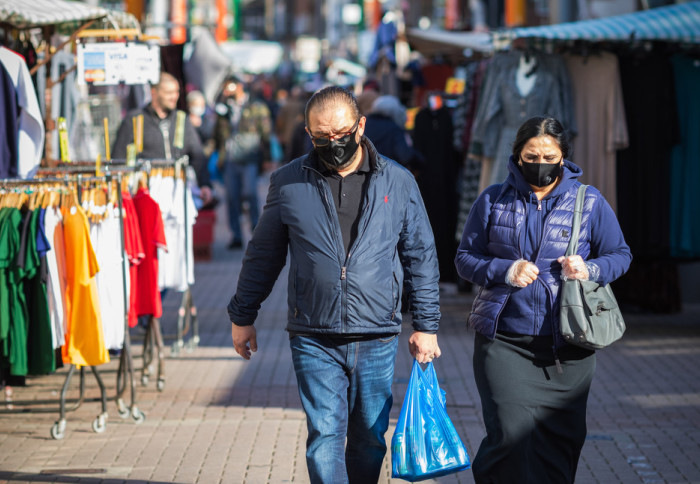More needs to be done to protect ethnic minority groups from COVID-19
by Ryan O'Hare

A new report has highlighted the disproportionate impact systemic racism can have on people’s health outcomes from COVID-19.
In an analysis, published this month in the BMJ, researchers from the UK and US have reviewed evidence of how systemic racism can exacerbate underlying health inequalities, leading to minority ethnic groups suffering higher rates of mortality and morbidity from the pandemic.
The report, from researchers at Imperial, St George’s University, Manchester University and Harvard University, shows that national policies and processes which largely disadvantage ethnic minorities – including areas such as housing, health and employment – have contributed to increased exposure to and worse outcomes from COVID-19 among Black, Asian and Minority Ethnic groups.
During the Covid-19 pandemic people from ethnic minority groups have experienced higher rates of infection, serious illness and death. Professor Azeem Majeed School of Public Health
Among a number of recommendations to redress the balance, they suggest ethnic minority groups could be defined as ‘clinically extremely vulnerable’ to COVID-19, with guidelines devised to consider which patients may be at greatest risk and to reduce their exposure to the disease.
Professor Azeem Majeed, from Imperial’s School of Public Health and one of the report authors, explains: “During the Covid-19 pandemic people from ethnic minority groups have experienced higher rates of infection, serious illness and death.
"It’s important for employers to recognise this vulnerability to adverse health outcomes when carrying out occupational risk assessments; and for the NHS to prioritise frontline healthcare professionals from ethnic minority backgrounds for vaccination”
Evidence of structural racism
Writing in the BMJ paper, the authors describe how data from the first wave of the pandemic show ethnic minorities were up to twice as likely to die from COVID-19 in the UK, with higher diagnosis rates, hospitalisations and admission to intensive care units.
Exploring several possible societal causes for these trends, they discuss the impact of racism and discrimination as root causes of health inequalities and increases in mortality and morbidity.
COVID-19 has powerfully illustrated that racism is a societal pathogen that is spreading disease and death on a grand scale. Professor David Williams Harvard University
Among these, they argue structural racism – policies and processes embedded in society, which disadvantage ethnic minorities – has the most damaging effect on health out of all forms of racism.
One aspect of this is residential segregation. The authors cite that Bangladeshi and Pakistani people in the UK more likely to live in deprived neighbourhoods than white British people, arguing that such segregation has previously been shown to have a negative impact on health in the US. They add that living in poorer areas, combined with lower socioeconomic status, high risk occupations and higher burden of chronic diseases, leads to poorer health outcomes.
The report adds that cultural racism, stemming from stereotypes, has also been shown to have detrimental effects on health. They explain that unconscious bias can affect patient interactions with physicians, leading to poorer quality communication during consultations or treatment.
In addition, the researchers also describe the impact of COVID-19 on healthcare workers in the UK. Black and Asian staff represent 21% of the NHS workforce, but accounted for 63% of deaths among health and social care workers during the first wave of the pandemic.
Professor David Williams, a co-author from Harvard University, said: “COVID-19 has powerfully illustrated that racism is a societal pathogen that is spreading disease and death on a grand scale. This paper describes the multiple pathways by which racism adversely affects health, and calls for a renewed commitment to dismantling all of the structures of racism so that everyone can experience all of the opportunities promised by our society.”
The paper makes a number of recommendations, including:
- Recognising racism in its various forms as a major driver of ill health
- Programmes for prevention of COVID-19 in partnership with ethnic minority communities
- Including ethnic minority groups in the ‘extremely vulnerable’ category for COVID-19
- Occupational risk assessment tools to reduce the risk of employees’ exposure to COVID-19
- Supporting employees and redeploying them away from Covid-19 areas wherever possible
- Promoting healthy lifestyles and effective management of chronic conditions, such as diabetes and hypertension, which disproportionately affect ethnic minority groups and are associated with more severe Covid-19 disease
Dr Mohammad Razai, first author on the paper, from St George’s, University of London, said: “Our paper shows the weight of evidence and historical trends demonstrating poorer outcomes for ethnic minority patients.
“The effects of racism, in particular systemic racism, are still not widely recognised and must be acknowledged by both healthcare professionals and policymakers so that more can be done to redress the balance and reduce these inequalities.”
-
‘Mitigating ethnic disparities in covid-19 and beyond’ by MS Razai et al. is published in the BMJ.
This article is based on materials from St George’s, University of London.
Article text (excluding photos or graphics) © Imperial College London.
Photos and graphics subject to third party copyright used with permission or © Imperial College London.
Reporter
Ryan O'Hare
Communications Division